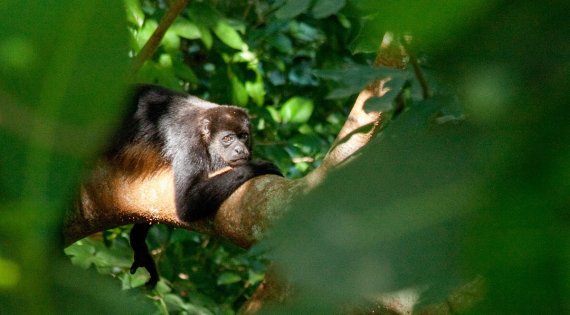Mantel Howler (Alouatta palliata) in Panama – photo Yorick Liefting
Animals play an important role in the lifecycle of trees. By eating or storing fruits they disperse seeds. In tropical forests in Africa, America or India more than 80 percent of the species are dependent on seed dispersal by animals. Especially trees with large seeds suffer from poaching. Their seeds are dispersed less. This has consequences for carbon storage of tropical forests, a team of researchers showed in Nature Communications.
‘Large animals such as apes, toucans and agouti are good seed dispersers, because they have a large habitat’, Patrick Jansen (Resource Ecology) explains. He is one of the researchers. ‘When animals disappear, the seeds fall right beneath the tree. This is about the worst possible place, because there are already trees there. The reproductive success is thus low.’ The result is that species with large seeds are replaced by species with small seeds which are dispersed by small animals or abiotically.
Tree species with small seeds were found to be smaller as adults. And this impacts the carbon storage of those forests. In a simulation it was shown that they capture a lot less carbon. The researchers measured how the biomass changed due to the replacement of large-seeded species in ten tropical forests worldwide. The effects were shown to be considerable.
Many protected forests in the tropics look intact, but in reality they are heavily damaged because the fauna is eradicated.
Patrick Jansen
In the tropical forests of Africa, America and India the carbon loss reaches up to 12 percent in the worst case scenario. This is with a total replacement of large-seeded species. This is comparable to the amount of carbon which disappears in the atmosphere in 14 year tropical deforestation. In South-eastern Asia and Australia the effects are marginal or even a small gains in carbon storage is taking place. In those forests the abiotically dispersed species already dominate.
Jansen points out another way with which poaching leads to a reduction in carbon storage. According to him also vines profit indirectly from the animal loss. ‘Most vine species are distributed by wind. But vines hardly make wood and thus they capture a lot less carbon. When the dominance of vines increases due to poaching, the amount of carbon that forests hold reduces substantially.’
According to Jansen, when focussing on climate regulation it is wise not to only protect trees, but also fauna of tropical forests. ‘Many protected forests in the tropics look intact, but in reality they are heavily damaged because the fauna is eradicated. These ‘empty’ forests will gradually totally change character.’ The good news is that it will take a while before it happens. Many trees in the tropics live hundreds of years. A shift will therefore take some time.

